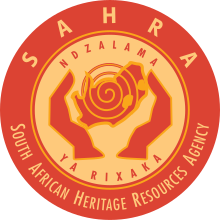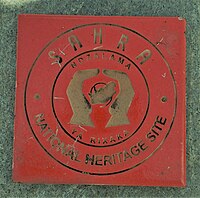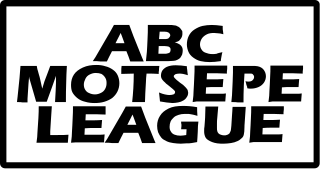
The SAFA Second Division (known as the ABC Motsepe League for sponsorship reasons, and previously the Vodacom League between 1998 and 2012, was founded in 1998 as the overall third tier of South African football. The competition is regulated by SAFA, and until 2012 had been sponsored by mobile telecommunications company Vodacom.
The National Archives and Records Service is an institutional network, operating on a centralised and decentralised provincial basis under central government control. The National Archives and Records Service of South Africa was established by passing of the National Archives and Records Service of South Africa Act in 1996.

Section 27 of the National Heritage Resources Act (NHRA) of South Africa provides for places of historic or cultural importance to be designated national heritage sites. This came into effect with the introduction of the Act on 1 April 2000, when all former national monuments declared by the former National Monuments Council and its predecessors became provincial heritage sites as provided for in Section 58 of the Act.
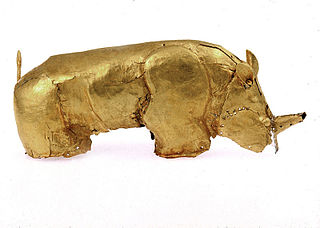
Heritage objects in South Africa are objects or collections formally declared as such by the South African Heritage Resource Agency in order to control their export. Declaration does not restrict the sale or ownership of the objects.
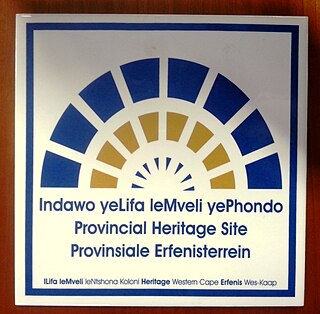
Provincial heritage sites in South Africa are places that are of historic or cultural importance within the context of the province concerned and which are for this reason declared in terms of Section 28 of the National Heritage Resources Act (NHRA) or legislation of the applicable province. The designation was a new one that came into effect with the introduction of the Act on 1 April 2000 when all former national monuments declared by the former National Monuments Council and its predecessors became provincial heritage sites as provided for in Section 58 of the Act.

The South African National Roads Agency SOC Ltd or SANRAL is a South African parastatal responsible for the management, maintenance and development of South Africa's proclaimed National Road network which includes many National ("N") and some Provincial and Regional ("R") route segments.
Water Boards play a key role in the South African water sector. They operate dams, bulk water supply infrastructure, some retail infrastructure and some wastewater systems. Some also provide technical assistance to municipalities. Through their role in the operation of dams they also play an important role in water resources management. The Water Boards report to the Department of Water Affairs (DWA). There are 13 Water Boards in South Africa, together indirectly serving more than 24 million people in 90 municipalities in 2005, or about half the population of South Africa.

Heritage Western Cape (HWC) is a provincial heritage resources authority established by the Minister of Cultural Affairs and Sport of the government of the Western Cape province in South Africa. It is a public entity set up under the terms of the National Heritage Resources Act. It is mandated to care for that part of South Africa's national estate that is of provincial and local significance in the Western Cape. It may delegate responsibility for heritage resources of local significance to competent municipal governments.

The National Monuments Council (NMC) was the national heritage conservation authority of South Africa, and therefore also of Namibia, during the major part of the apartheid era. It was the successor body to the Historical Monuments Commission and became known principally for its declaration of several thousand national monuments. It came into being through the promulgation of the National Monuments Act of 1969 and ceased to exist on 31 March 2000 when it was replaced by SAHRA and the provincial heritage resources authorities established in terms of the National Heritage Resources Act of 1999.
Amafa aKwaZulu-Natali, commonly known as 'Amafa', is a provincial heritage resources authority in terms of South Africa's National Heritage Resources Act. It was established in 1997 in terms of the KwaZulu-Natal Heritage Act of that year and is an agency of the Office of the Premier of the government of the KwaZulu-Natal Province of South Africa. It is also a 'public entity' under the terms of the Public Finance Management Act. It is mandated to care for that part of South Africa's national estate that is of provincial and local significance in KwaZulu-Natal.
A provincial heritage resources authority (PHRA) is a government agency established at provincial level in South Africa and is responsible for the management of immovable heritage. In some instances, they are also responsible for moveable heritage, interpretation centres and museums.
The Northern Cape Heritage Resources Authority, previously called Ngwao Boswa jwa Kapa Bokone, and commonly known as 'Boswa', is a provincial heritage resources authority established in 2003 by the MEC for Sport, Arts and Culture in the Northern Cape Province of South Africa, and reconstituted in terms of the Northern Cape Heritage Resources Authority Act, 2013. It is an institution set up under the terms of the National Heritage Resources Act. It is mandated to care for that part of South Africa's national estate that is of provincial and local significance in the Northern Cape.
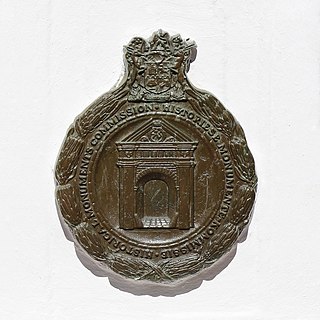
The Historical Monuments Commission (HMC) was the national heritage conservation authority of South Africa from 1923 to 1969. The HMC was the first such body to be established in South Africa and was the predecessor of the National Monuments Council and therefore also of SAHRA and South Africa's provincial heritage resources authorities. From 1934 onwards the Commission became known principally for its declaration of several hundred historical monuments, later known as 'national monuments' and today as provincial heritage sites.

The South African Hockey Association (SAHA) is the governing body of field hockey in South Africa. It is affiliated to FIH International Hockey Federation and AHF African Hockey Federation. The Head Office of SAHA is in Illovo, Johannesburg, South Africa.
The 2018 Africa T20 Cup was the fourth and final edition of the Africa T20 Cup, a Twenty20 cricket tournament. It was held in South Africa in September 2018, as a curtain-raiser to the 2018–19 South African domestic season. Provincial side KwaZulu-Natal Inland were the defending champions.
The 2019–20 CSA Provincial T20 Cup was a domestic Twenty cricket tournament that took place in South Africa in September 2019, as a curtain-raiser to the 2019–20 South African domestic season. It was played between the thirteen South African provincial teams, along with Limpopo and Mpumalanga. This was the sixth edition of the CSA Provincial T20 Cup, which was last played in the 2015–16 season. With only domestic teams from South Africa taking part, the tournament returned in place of the Africa T20 Cup, which had been held since 2015.
The 2020–21 CSA 3-Day Provincial Cup was a first-class cricket competition that took place in South Africa during February and March 2021. Easterns and KwaZulu-Natal were the defending champions, after the title was shared due to the COVID-19 pandemic.
The 2020–21 CSA Provincial One-Day Challenge was a domestic one-day cricket tournament that was played in South Africa in February and March 2021. Free State and Northern Cape were the defending champions, after the title was shared due to the COVID-19 pandemic.
